Yesterday, 14 December 2019, the queen of the Nouvelle Vague, film actress, singer and director Anna Karina has passed away. French, but Danish-born Karina was the muse of director Jean-Luc Godard and starred in eight of his films. “Today, French cinema has been orphaned. It has lost one of its legends,” culture minister Franck Riester tweeted. Anna Karina was 79.
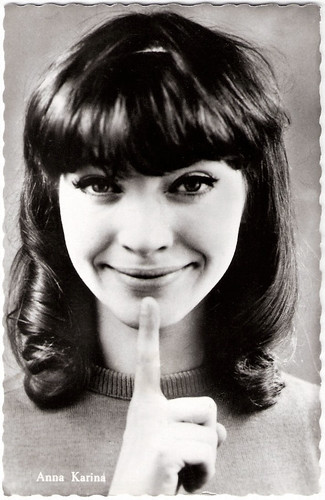
Dutch postcard by Hafbo film, no. 162. Photo: publicity still for Une femme est une femme/A Woman Is a Woman (Jean-Luc Godard, 1961).
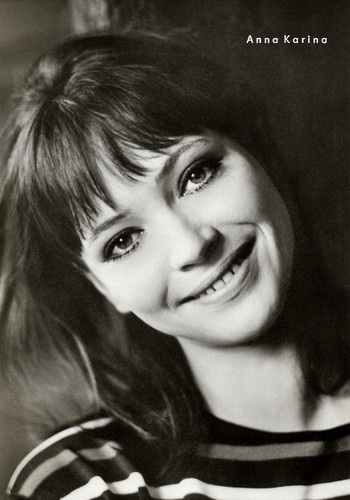
East-German postcard by Progress Film-Verleih, Berlin, no. 2/74, 1974. Photo: Unifrance Film.
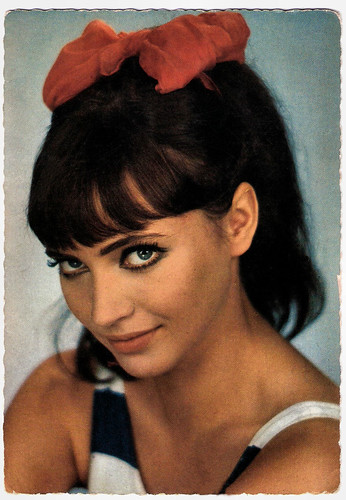
French postcard by E.D.U.G., no. 471. Photo: Sam Lévin.
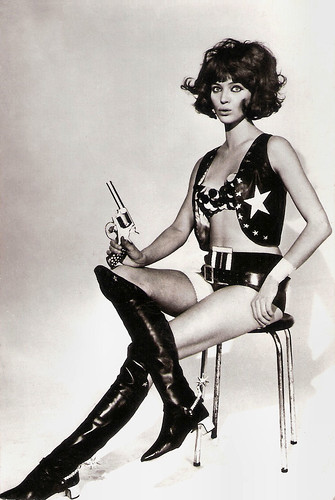
Romanian postcard by Casa Filmului Acin, no. 209.
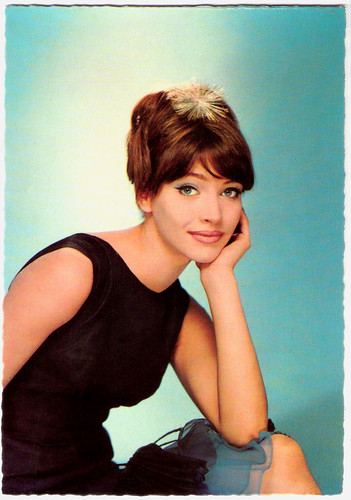
French postcard by E.D.U.G., Paris, no. 181, 1969. Photo: Sam Lévin.
Anna Karina was born Hanne Karen Blarke Bayer in Solbjerg, Denmark, in 1940. Her mother was a dress shop owner and her father was a ship's captain. Before she turned one, her father had left her mother.
First, she was raised by her maternal grandparents, where she stayed until the age of four. Then she spent time in and out of foster homes, before returning to live with her mother from the age of eight. She has described her childhood as 'terribly wanting to be loved' and as a child, she made numerous attempts to run away from home.
She began her career in Denmark, where she sang in cabarets and worked as a model playing in commercials. At age 14, she appeared in the Danish short film Pigen og skoene/Girls and Shoes (Ib Schedes, 1954-1959), which was presented at the Cannes Film Festival 1959 and won a small award. She studied dance and painting in Denmark and for a while made a living selling her paintings.
In 1958, after a row with her mother, she hitchhiked to Paris. She had a break when sitting briefly at the cafe Les Deux Magots, she was approached by a woman from an advertisement agency who asked her to take some photos. Hanne became a rising fashion model and met Coco Chanel and Pierre Cardin. Chanel advised her to use a professional name, Anna Karina.
She made a series of Palmolive ads in a bath covered in soapsuds and was noticed by Jean-Luc Godard, then a film critic for Cahiers du cinéma. Godard was casting his debut feature film, À bout de souffle/Breathless (1960) starring Jean-Paul Belmondo. He offered her a small role, but she refused when he mentioned that there would be a nude scene. However, she eventually accepted his offer to play a major role in his second film, Le Petit Soldat/The Little Soldier (1960) with Michel Subor. Karina, who was still under 21 had to persuade her estranged mother to sign the contract for her.
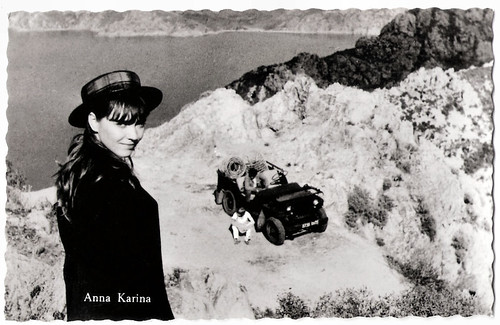
Dutch postcard by N.V. v.h. Weenenk & Snel, Baarn, no. 853. Photo: Hafbo-film. Publicity still for Le soleil dans l'oeil/Sun in Your Eyes (Jacques Bourdon, 1962).
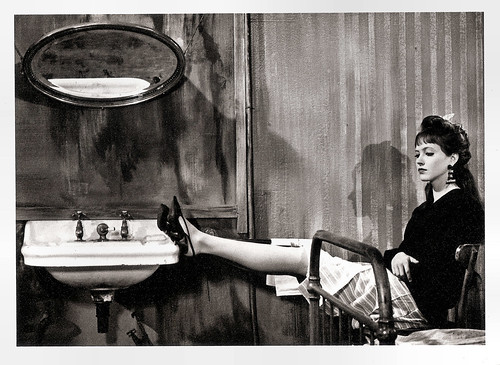
French postcard by Edition Librairie de la Fontaine, Paris, no. 5 (Tirage limité à 250 exemplaires). Photo: Claude Schwartz / Spadem, Paris. Caption: Anna Karina, 1963.
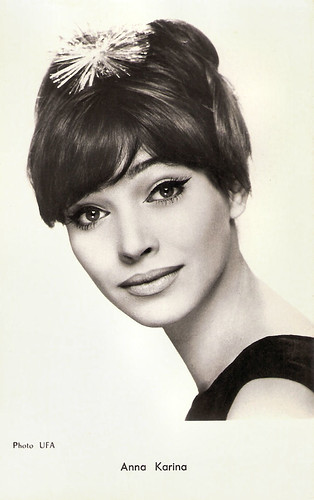
French postcard by Editions P.I., Paris, no. FK 110. Photo: Ufa.

Belgian collectors card by Music-Fan magazine, no. 47.
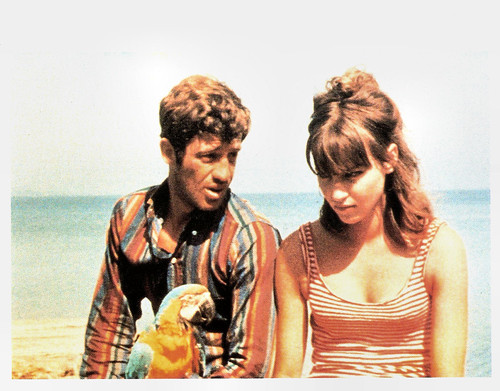
French postcard by La Cinémathèque française, no. CF 5006, 1998. Photo: UGC Da International. Jean-Paul Belmondo and Anna Karina in Pierrot le fou (Jean-Luc Godard, 1965).

Dutch postcard by Hafbo film, no. 162. Photo: publicity still for Une femme est une femme/A Woman Is a Woman (Jean-Luc Godard, 1961).

East-German postcard by Progress Film-Verleih, Berlin, no. 2/74, 1974. Photo: Unifrance Film.

French postcard by E.D.U.G., no. 471. Photo: Sam Lévin.

Romanian postcard by Casa Filmului Acin, no. 209.

French postcard by E.D.U.G., Paris, no. 181, 1969. Photo: Sam Lévin.
Fashion model
Anna Karina was born Hanne Karen Blarke Bayer in Solbjerg, Denmark, in 1940. Her mother was a dress shop owner and her father was a ship's captain. Before she turned one, her father had left her mother.
First, she was raised by her maternal grandparents, where she stayed until the age of four. Then she spent time in and out of foster homes, before returning to live with her mother from the age of eight. She has described her childhood as 'terribly wanting to be loved' and as a child, she made numerous attempts to run away from home.
She began her career in Denmark, where she sang in cabarets and worked as a model playing in commercials. At age 14, she appeared in the Danish short film Pigen og skoene/Girls and Shoes (Ib Schedes, 1954-1959), which was presented at the Cannes Film Festival 1959 and won a small award. She studied dance and painting in Denmark and for a while made a living selling her paintings.
In 1958, after a row with her mother, she hitchhiked to Paris. She had a break when sitting briefly at the cafe Les Deux Magots, she was approached by a woman from an advertisement agency who asked her to take some photos. Hanne became a rising fashion model and met Coco Chanel and Pierre Cardin. Chanel advised her to use a professional name, Anna Karina.
She made a series of Palmolive ads in a bath covered in soapsuds and was noticed by Jean-Luc Godard, then a film critic for Cahiers du cinéma. Godard was casting his debut feature film, À bout de souffle/Breathless (1960) starring Jean-Paul Belmondo. He offered her a small role, but she refused when he mentioned that there would be a nude scene. However, she eventually accepted his offer to play a major role in his second film, Le Petit Soldat/The Little Soldier (1960) with Michel Subor. Karina, who was still under 21 had to persuade her estranged mother to sign the contract for her.

Dutch postcard by N.V. v.h. Weenenk & Snel, Baarn, no. 853. Photo: Hafbo-film. Publicity still for Le soleil dans l'oeil/Sun in Your Eyes (Jacques Bourdon, 1962).

French postcard by Edition Librairie de la Fontaine, Paris, no. 5 (Tirage limité à 250 exemplaires). Photo: Claude Schwartz / Spadem, Paris. Caption: Anna Karina, 1963.

French postcard by Editions P.I., Paris, no. FK 110. Photo: Ufa.

Belgian collectors card by Music-Fan magazine, no. 47.

French postcard by La Cinémathèque française, no. CF 5006, 1998. Photo: UGC Da International. Jean-Paul Belmondo and Anna Karina in Pierrot le fou (Jean-Luc Godard, 1965).
Nouvelle Vague
Anna Karina and Jean-Luc Godard married during the shooting of their next film, Une femme est une femme/A Woman Is a Woman (1961) with Jean-Paul Belmondo and Jean-Claude Brialy. It is a tribute to American musical comedy and the first film which Godard shot in colour and Cinemascope.
Judd Blaise at AllMovie: "Rather than the sometimes alienating, dense intellectualism of later Godard works, Une femme est une femme offers aesthetic pleasure through luxurious visuals and a charming musical score by Michel Legrand. Against this bright backdrop, Karina proves particularly fetching, capturing the film's frolicsome mood in an unforced manner. While not one of Godard's most groundbreaking or influential films, Une femme est une femme is one of his most appealing and pleasurable efforts."
J. Hoberman at Criterion: "Mainly, A Woman Is a Woman is a valentine to Karina, who became pregnant during the course of the movie’s production; she and Godard were married in March 1961, an event that made the cover of Paris Match." At the Berlin Film Festival in 1961, Anna Karina was awarded Best Actress for Une femme est une femme.
In the following years, the couple made Vivre sa Vie/My Life to Live (1962), Bande à part/Band of Outsiders (1964), Alphaville, une étrange aventure de Lemmy Caution/Alphaville, a Strange Adventure of Lemmy Caution (1965) with Eddie Constantine, Pierrot le fou/Pierrot Goes Wild (1965) with Jean-Paul Belmondo, Made in U.S.A. (1966) with Jean-Pierre Léaud and the anthology film Le plus vieux métier du monde/The Oldest Profession (1967).
Though their cinematic collaboration seemed harmonious, their relationship was tumultuous and bitter behind the scenes. It was made all the more difficult by the fact that their relationship was under constant public scrutiny. Their three-year marriage ended in 1964, though they continued to work together until 1966. In 1967, Godard and Karina divorced.
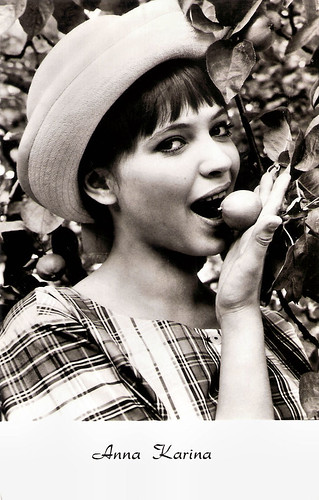
Dutch postcard by Gebr. Spanjersberg N.V, Rotterdam, no. 6099. Photo: Combi Press, Amsterdam.
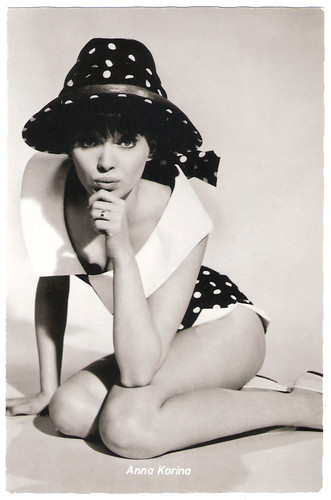
German postcard by Kolibri-Verlag G.m.b.H., Minden-Westf., no. 1872.
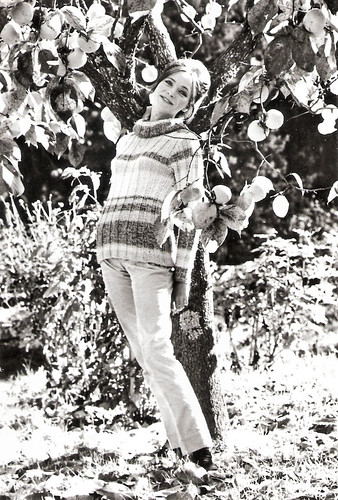
Romanian postcard by Casa Filmului Acin, no. 133.
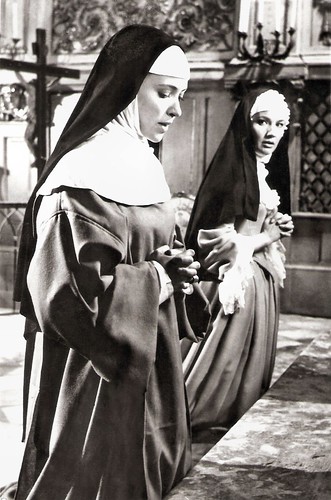
Romanian postcard by Casa Filmului Acin, no. 265. Photo: publicity still for La Religieuse/The Nun (Jacques Rivette, 1966).
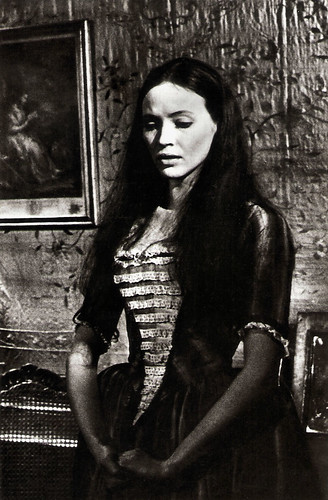
Romanian postcard by Casa Filmului Acin, no. 330. Photo: publicity still for La Religieuse/The Nun (Jacques Rivette, 1966).
Hollywood
Hal Erickson at AllMovie: "From all reports, Karina and Godard's relationship was symbiotic; it is certainly no coincidence that both actress and director went into a temporary artistic eclipse after their 1967 breakup."
Anna Karina's acting career was not, however, limited to Godard's films, and she had a successful collaboration with other well-known directors. Some consider her best performance her role in La Religieuse/The Nun (Jacques Rivette, 1966) in which she plays an intelligent, freedom-loving woman who is forced into a convent against her will.
She also acted in the Italian productions Le Soldatesse/The Camp Followers (Valerio Zurlini, 1965) and the Albert Camus adaptation Lo Straniero/The Stranger (Luchino Visconti, 1967) starring Marcello Mastroianni.
Karina also maintained a singing career and scored hits with 'Sous le soleil exactement' and 'Roller Girl'. Both songs, which Serge Gainsbourg had specially written for her, were taken from the TV musical Anna (Pierre Koralnik, 1967).
After her divorce in 1967, she went to Hollywood. She acted in Justine (George Cukor, 1969) and then returned to Paris. Her later films included Laughter in the Dark (Tony Richardson, 1969), Rendez-vous à Bray/Appointment in Bray (André Delvaux, 1971) with Mathieu Carrière, Pane e cioccolata/Bread and Chocolate (Franco Brusati, 1973) starring Nino Manfredi, Chinesisches Roulette/Chinese Roulette (Rainer Werner Fassbinder, 1976), and Olyan mint otthon/Just Like Home (Márta Mészáros, 1978) with Jan Nowicki.

Small Romanian collector's card. Photo: Anna Karina and Gérard Barray in Sheherazade (Pierre-Gaspard-Huit, 1963).
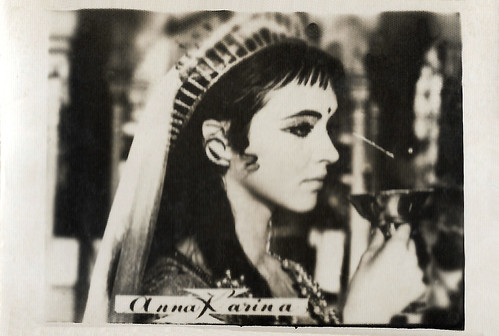
Small Romanian collectors card. Photo: Anna Karina in Shéhérazade (Pierre Gaspard-Huit, 1963).

East-German postcard by VEB Progress Filmvertrieb, Berlin, no. 177/69, 1969. Retail price: 0,20 M. Photo: Unifrance Film.

Big East-German card by VEB Progress Filmvertrieb, Berlin, no. 6/71. Photo: Unifrance Film.

East-German postcard by Progress Film-Verleih, Berlin, no. 154/76, 1976. Photo: Linke.
Chansons de films
Anna Karina acted in but also wrote, produced and directed Vivre ensemble/Living Together (1973). She has also written three novels and made several appearances on television. In 2005 she released 'Chansons de films', a collection of songs sung in films. She appeared on stage in Jacques Rivette's adaptation of La Religieuse/The Nun, 'Pour Lucrece, Toi et Tes Nuages', Francoise Sagan's 'Il Fait Beau Jour et Nuit' and Ingmar Bergman's 'Apres La Répétition/After the Repetition'.
Incidentally, she played in films like L'oeuvre au noir/The Abyss (André Delvaux, 1988) with Gian Maria Volonté, Haut bas fragile/Up, Down, Fragile (Jacques Rivette, 1995) and the romantic thriller The Truth About Charlie (Jonathan Demme, 2002) starring Mark Wahlberg.
Karina's final film as a director was Victoria (2008) in which she also starred. Mark Deming at AllMovie: "Thirty-five years after directing her first feature film, iconic actress Anna Karina once again steps behind the camera for this charming comedy-drama shot in Canada. Jimmy (Emmanuel Reichenbach) and Stanislas (Jean-Francois Moran) are a pair of nightclub performers who play second-rate gay nightclubs as part of a drag act called 'Les Lolitas'."
After Godard, Anna Karina was married three times more: to scriptwriter-actor Pierre Fabre (1968–1973), actor-director Daniel Duval (1978–1981) and director Dennis Berry (1982–1994). Since 2009, she has been married to Maurice Cooks.
On 14 December 2019, Anna Karina died in a Paris hospital of the effects of cancer at the age of 79, her agent Laurent Balandras told AFP, adding that she passed away in the company of her fourth husband, American director Dennis Berry.

Spanish postcard by Postal Oscarcolor.
Scenes from Vivre sa vie (1962). Source: Paulo A (YouTube).
Anna Karina sings 'Jamais je ne t'ai dit que je t'aimerai toujours' in Pierrot le Fou (1965) with Jean-Paul Belmondo. Source: Tobe Auster (YouTube).
Trailer Made in U.S.A. (1966). Source: Danios 12345 (YouTube).
Sources: Judd Blaise (AllMovie - Page now defunct), J. Hoberman (Criterion), James Travers (French Films), Mark Deming (AllMovie - Page now defunct), Hal Erickson (AllMovie - Page now defunct), Luis Miguel Oliveira (Czarabox - Portuguese), The Guardian, IMDb and Wikipedia.
This post was last updated on 3 December 2024.
10 comments:
What incredible eyes she has!
I love this era in film and style.
What a wonderful collection!
Great cards and fascinating story, thanks for stopping by. And I never thought of it, but you are quite likely right he may have been the only one.
Bob, it is such a natural looking postcard, the one of Anna Karina! She's lovely and looks a little like Audrey Hepburn, no?
I saw Marcello Mastroianni in "Bell'Antonio" when I was young and dating a boy who was much more mature than I was. I was shocked by the movie but never forgot it. I'm sure it is a classic today! :)
Thanks for commenting at my PFF post. I really appreciate it.
I checked to see if I could find any images of her artwork with no luck. But I found these two of interest:
http://www.geraldlaing.com/index.php/prints/artwork/anna_karina_print/
http://www.flickr.com/photos/hannahkarina/399018100/
All three clips were great. I love the street scene in the first...interesting how there was no sound...no talking in that part of it.
Wow, thank you for sharing this little bit of history. I went to school with a girl who was named Anna Karina Villatorres (in Guatemala, CA), she said she was named after a movie star, her father chose the name. She dose have incredible eyes!!
I love that she hitch hiked to Paris and was discovered at Les Deux Magots. That's a movie in itself. Thanks again for an entertaining and informative post.
Thank you all for stoppong by and for your comments. Mary, I'm very curious now about Bel Antonio. Must see that film. And, Anita, thanks for the links, they're an interesting addition to the post. Till next PFF!
Post a Comment